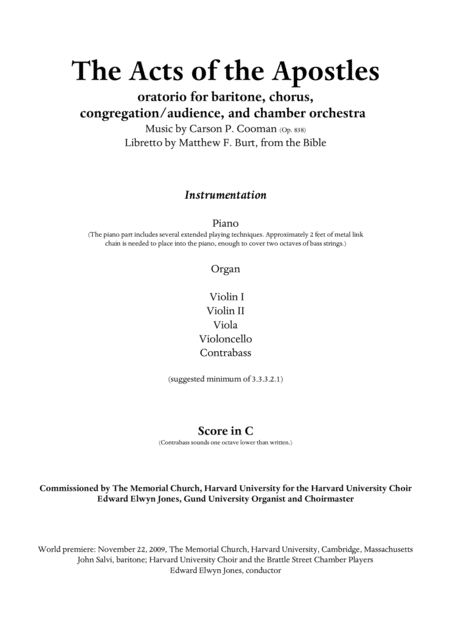Chamber Orchestra - Level 5 - Digital Download SKU: A0.533578 Composed by Carson Cooman. Christian,Contemporary,Spiritual. Score and parts. 189 pages. Musik Fabrik Music Publishing #3025409. Published by Musik Fabrik Music Publishing (A0.533578). The Acts of the Apostles (2009), an oratorio for baritone, chorus, congregation/audience, and chamber orchestra (piano, organ, strings-suggested minimum of 3.3.3.2.1),was commissioned by The Memorial Church at Harvard University. It is dedicated to Edward Elwyn Jones and theHarvard University Choir.The biblical books of Luke and Acts form a pair of documents from a single author and with a single audience (thelikely-metaphorical âTheophilusâ), yet they are unusual for being composed in such contrasting genres. Lukeâsgospel, using Mark as a primary source throughout, features a comparable literary style to that of the otherevangelists. Acts, by contrast, is a historical monograph that charts the birth of the Church with dramatic storiesaboutâand speeches fromâthe apostles, painting a vivid, if not necessarily chronological, picture of their victoriesand struggles. As such, it is a book that provides excellent source material for a dramatic choral libretto of this scale.Although much of Acts is focused on the ministry of Saul/Paul, this oratorio draws most of its material from thefirst third of the book, prior to and including the conversion of Saul. In the Prologue, Christâs ascension is narratedandâfollowing an orchestral Sinfoniaâthe chorus sings words of Jesus from the Sermon on the Plain in Lukeâsgospel that foreshadow many of the trials the apostles go on to face. The astounding account of Pentecost follows:here, words from the book of Ruth, customarily read on the feast of Shavuot (Pentecost), are included, telling thestory of a Moabite woman who converted to the Israelite faithâa parallel to the expansion of the Christian messageto all nations by the gift of the Holy Spirit. The Prayer for Boldness, quoting Psalm 2, asks God for protection fromthe threats of persecution that the apostles will now face.Stephen, regarded as the proto-martyr of the Christian Church, offers one of the most developed speeches in Acts,only a small portion of which is presented here. Full of scriptural references, including the quotation from IsaiahâHeaven is my throneâ¦â, the end of the narrative is remarkable for two reasons: firstly, Stephenâs final wordsmirror those of Christ on the cross in Lukeâs gospelâwhere Jesus forgives his executioners and prays âFather, intoyour hands I commend my spiritâ (Luke 23:46); secondly, Saul is specifically mentioned as one who approved ofStephenâs stoning, indicative of the redemptive possibilities of the Christian message.The account of the baptism of the Ethiopian eunuch here in the oratorio ends with the First Song of Isaiahâwhilenot quoted in Acts, it seems a fitting conclusion to the scene as Philip and the eunuch were reading Isaiah together,and the canticle has often been associated by Christians with the rite of baptism. Similarly, the story of SaulâsConversion is followed here by a Christological poem found in Paulâs letter to the Philippians, though it is likely aquotation from an earlier source. It is often regarded as the earliest extant Christian hymn.The Acts of the Apostles concludes with Lukeâs realistic assessment that in spite of Paulâs energetic evangelism manyremained unconvinced by the Christian message. At the heart of both Lukeâs gospel and Acts is the tension betweenthe uniquely important role of the Jewish traditions that Jesus himself practiced and the expansion of the gospel togentiles, of whom Luke himself is one. It is appropriate, therefore, to follow Paulâs message of salvation to thegentiles with the Magnificat: a canticle that emphasizes the promises of God to the people of Israel throughouthistory.Three traditional hymn texts are found in the oratorio, each set congregationally to a pre-existing tune. The first,âSpirit of mercy, truth, and loveâ is an eighteenth century poem that e.
